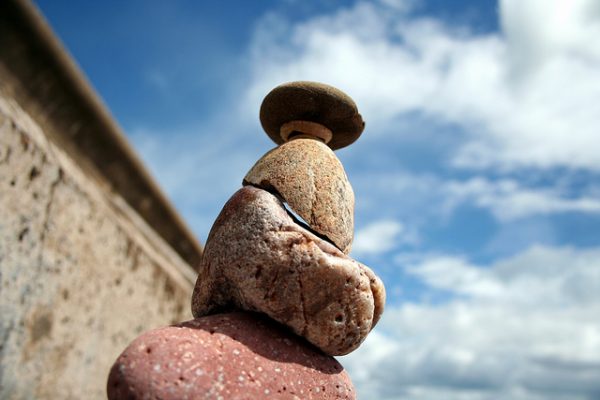Balancing Disability and a Career

Photo credit: Murray Barnes, CC BY 2.0.
When I was a kid, life was rough. In 1993, I started collecting chronic illnesses — a process I haven’t been able to stop. By the time I was in high school, I’d come home to eviction notices on our door or debtors calling incessantly. I was determined to not encounter that in adulthood. I wanted to serve as a source of stability for me and my sister.
Unfortunately, I didn’t realize just how much impact my illnesses would have on my ability to work.
People assume that everyone who is disabled gets financial assistance, and that’s far from the truth. Just like anyone else, we generally have to work. Getting on SSDI is not easy and is, in fact, out of reach for many of us.
Shortly after getting married, I landed a job I loved as an administrative assistant for pediatricians. It was wonderful to be able to support them in their work. I quickly maxed out on my ability to juggle multiple things, though, when I had to go through weekly physical therapy. Throw in missing a few days a month because I literally couldn’t leave the house, and it was rough. The doctors understood and were happy that I was taking care of myself. Sadly, I started getting flack from other administrative staff. It became clear that people felt my health issues were making things harder despite the fact that I was getting everything done and more.
The ableism I was facing at work was taking its toll. Being in an emotionally harmful place does not help health issues at all. When a family member passed away and left my husband some money, I made the hard decision to leave my job. I thought that I could get freelancing to take off quickly enough that we wouldn’t really go into debt.
I was wrong.
It’s been two years since then. Together, my husband and I have nearly $50,000 of credit card debt on top of $155,000 in student loans.
I try to save money where I can. I use browser add-ons like Honey and apps like Ibotta to get money back on expenses. When I’m able to, I shop around, picking up what we need at the lowest prices possible. If we had the right sunlight levels on our balcony, I would grow a small amount of food. I’ve pushed off getting dental work I need because, frankly, we can’t afford it right now.
People make working from home sound like the perfect thing. It is not easy. There are distractions like housework, errands, and our adorable guinea pigs. It’s even harder when you’re ill, though. Balancing taking care of myself and working — something I’m terrible at doing — is a difficult skill to master. I’d love to go back to working outside of the home, but it’s something that isn’t accessible for me and my body.
Part of the problem is that I was extremely ill over the past year. I’ve had to get a number of invasive and expensive tests done. Despite having good insurance through my husband’s job, we’ve been struggling to pay my medical bills. Most of them go onto credit cards that we then struggle to pay.
Of course, being unpredictably ill is hard to deal with. When you’re struggling to form complete sentences or have incredibly high fatigue, it’s really hard to get job opportunities. The Americans with Disabilities Act (ADA) forbids discrimination and requires workplaces to be accommodating. Nearly 30 years later, people don’t actually know or follow that law. My last day job was not the first one I’ve left due to ableism and discrimination.
The one thing that has helped me has been being a sex educator. Doing presentations around sexuality has helped me bring in money. Since I talk about the intersections of illness and sexuality, people understand when I warn them that I may not be able to find the word I want to use right away.
It’s amazing how much more forgiving and accepting people can be in a one-off situation versus a long-term job.
I also don’t have to hide who I am as a sex educator. At a normal day job, being proudly queer and disabled isn’t necessarily accepted. There is no way I could be “out” about my sexuality, gender, or health issues in past jobs I’ve held.
Thankfully, the last month has brought a lot of relief. I tend to thrive in the fall as the weather cools down. We’ve gotten my treatment regimens to a good and stable point (for now). I’m figuring out what things trigger allergic reactions and have changed up my diet. I also reached my out-of-pocket maximum on prescriptions, which frees up a lot of money.
I’m hoping that I will be able to pay down our credit cards by hustling to get more freelancing and speaking gigs. I love speaking and writing, so it comes naturally to me. When you enjoy something, it brings its own form of payment. The emotional happiness that comes along with helping people is something that I absolutely love.
It just doesn’t pay the bills.
I am scared, though. It feels like it’s only a matter of time before I go back to that place of unconjugated verbs and being unable to truly write. All it takes it just one of my conditions to flare up for me to lose my grip on the projects I’m juggling.
Having my body be a source of instability is terrifying, especially when our financial lives depend on it.
Kirsten Schultz is a sexuality educator, activist, and writer. Learn more about her work at ChronicSex.org.
This story is part of The Billfold’s Financial Struggles series.
Support The Billfold
The Billfold continues to exist thanks to support from our readers. Help us continue to do our work by making a monthly pledge on Patreon or a one-time-only contribution through PayPal.
Comments